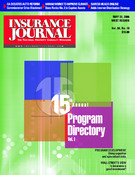The Hartford Financial Services Group, Inc. has settled with both the Connecticut and New York attorneys general regarding The Hartford’s use of expense reimbursement agreements in its terminal/maturity funding group annuity line of business.
Under the terms of the settlement, The Hartford will pay $20 million, of which $16.1 million will be paid to certain plan sponsors that purchased terminal or maturity funding annuities between Jan. 1, 1998 and Dec. 31, 2004, with the balance of $3.9 million to be divided equally between the states of New York and Connecticut.
The costs associated with the settlement have already been accounted for with reserves previously established. As part of the settlement, The Hartford will accept a three-year prohibition on the use of contingent compensation in its terminal/maturity funding group annuity line of business.
Commenting on the announcement, The Hartford’s Chairman and CEO Ramani Ayer said, “We have apologized to plan sponsors for not having provided full disclosure of the compensation paid. Resolving this matter was important for our company. We have cooperated fully with regulators during their investigations and will continue to do so.”
The settlement concludes an investigation that focused on The Hartford’s compensation arrangements with certain producers specializing in the sale of terminal and maturity funding group annuities. Both products involve the purchase of a single premium group annuity by a plan sponsor to assume all or a portion of the pension plan’s liabilities. A terminal funding annuity is used when a company terminates its pension plan. A maturity funding annuity is used by an ongoing business to satisfy its future obligations to pension plan participants.
To compensate producers who sold those annuities, The Hartford typically paid them a standard commission. In addition, The Hartford also had an expense reimbursement agreement with certain producers. During the six year period, 1998 – 2004, the company paid four producers a total of approximately $4 million. While The Hartford disclosed to plan sponsors the amount of standard commission paid, it did not disclose the additional payments made pursuant to the expense reimbursement agreements.
In 2004, The Hartford voluntarily eliminated the use of expense reimbursement agreements for producers in the terminal/maturity funding group annuity line of business.
“The Hartford was at the hub of a series of secret conspiracies that enriched both the brokers and The Hartford at the expense of their customers,” Conn. AG Richard Blumenthal said. “Our evidence shows a shocking systematic scheme that betrayed their moral and legal duties.”
According to Blumenthal, the brokers involved included Dietrich & Associates Inc., Brentwood Asset Advisors, Glastonbury-based USI Consulting Group and BCG Terminal Funding.
“There is no pleasure in uncovering wrongdoing by one of Connecticut’s best respected corporate citizens. Our continuing investigation of The Hartford and others must be pursued wherever the evidence leads. The Hartford has cooperated — taking the high road — and we hope others will as well. The message is that no one in this industry — insurers or brokers, big or small — can break the law and betray their trust,” Blumenthal added.
“Our reforms — stopping contingent commission agreements — will help prevent future insurance abuses. This investigation was spurred by a whistleblower, and we hope others with knowledge will come forward.”
N.Y. Attorney General Eliot Spitzer said the contingent commission scheme allowed Hartford to sell more than $800 million worth of group annuity pension plans from 1998 to 2004. According to Spitzer’s investigation, companies and institutions that faced increased costs as a result of the scheme included: Montgomery Ward Co.; Bennetton Sportssystem USA Inc; PriceWaterhouseCoopers; and Mt. Sinai Medical Center of Florida.
“This investigation shows how payoffs and deception influenced major deals for retirement products,” Spitzer said. “This was wrong. But the company at the center of the scandal has acknowledged misconduct, provided compensation for those who were harmed and implemented reforms that will help protect retirees in the future.”
As part of the settlement, The Hartford announced it would also:
- Provide Web site disclosure relating to compensation practices and policies in the terminal/maturity funding annuity line of business, and provide plan sponsors with information about all compensation paid, or to be paid, to producers in this line of business;
- Support legislation that would eliminate contingent compensation for group annuity products and that would increase disclosure of compensation; and
- Implement written standards of conduct and provide training to relevant employees regarding compensation paid to producers of terminal/maturity funding annuity products.
The Hartford says it has also heightened its focus on business ethics and increased accountability within its lines of business to strengthen day-to-day operational compliance with its guidelines and the laws governing all of itsbusinesses.
The Hartford, a Fortune 100 company, is a financial services and insurance company with 2005 revenues of $27.1 billion.
Was this article valuable?
Here are more articles you may enjoy.


 Insurance Broker Stocks Sink as AI App Sparks Disruption Fears
Insurance Broker Stocks Sink as AI App Sparks Disruption Fears  Chubb CEO Greenberg on Personal Insurance Affordability and Data Centers
Chubb CEO Greenberg on Personal Insurance Affordability and Data Centers  US Appeals Court Rejects Challenge to Trump’s Efforts to Ban DEI
US Appeals Court Rejects Challenge to Trump’s Efforts to Ban DEI  Insurify Starts App With ChatGPT to Allow Consumers to Shop for Insurance
Insurify Starts App With ChatGPT to Allow Consumers to Shop for Insurance 


